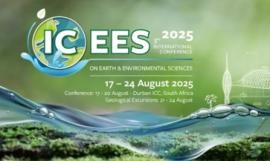
Water and Sanitation Deputy Minister David Mahlobo has called for bold innovation, cross-border collaboration, and sustainable practices to confront the escalating global water crisis.
Speaking at the 3rd International Conference on Earth and Environmental Sciences (ICEES 2025) gathering held this week, Mahlobo warned that South Africa’s water scarcity demands urgent action and cannot be treated as “business as usual.”
Organised by the University of Zululand in partnership with Chang’an University in China,
It provided delegates the opportunity to share knowledge, present groundbreaking research, and explore actionable strategies for ensuring a sustainable future.
Mahlobo participated in a high-level panel on Water Security and Sustainable Development Goal 6 (Clean Water and Sanitation) alongside the department’s Deputy Director-General, Dr Risimati Mathye, and uMngeni-uThukela Water Chief Executive, Sandile Mkhize.
“There is ample evidence showing how semi-arid our country is, and that it cannot be business as usual. That is why the department, and government published the National Water Resource Strategy Number 3.
“This aims to reassess the water deficit and to investigate new technologies, such as water desalination, as well as partnerships with higher education for research to improve existing water sources, including groundwater, effluent reuse, and assessing the cost-effectiveness and feasibility of these options,” Mahlobo said.
Mahlobo also emphasised the importance of integrating Indigenous Knowledge Systems and practices into solutions, as they are a form of science that modern technology can build upon.
“Communities are not passive beneficiaries; they are stakeholders. Their lived experiences of droughts and floods, and their land management practices, hold vital lessons for building resilience.”
He further challenged the scientific community to ensure that their research findings inform governance and decision-making, rather than remaining in academic silos.
“Being a scientist or engineer does not mean stepping away from governance. Choose to be part of the main table where critical decisions are made, or risk being sidelined while the future of shared prosperity is shaped without your input,” the Deputy Minister said.
The 2025 edition of the gathering held in KwaZulu-Natal, placed particular focus on climate change, sustainable water management, pollution control, and interdisciplinary approaches to global sustainability.
The ICEES 2025 aimed to bridge gaps between research and implementation, fostering collaborative solutions to global challenges.
In an era of escalating environmental crises, the conference highlighted the role of scientific communities in shaping policies, driving sustainable practices, and promoting global equity. – SAnews.gov.za
No comments:
Post a Comment